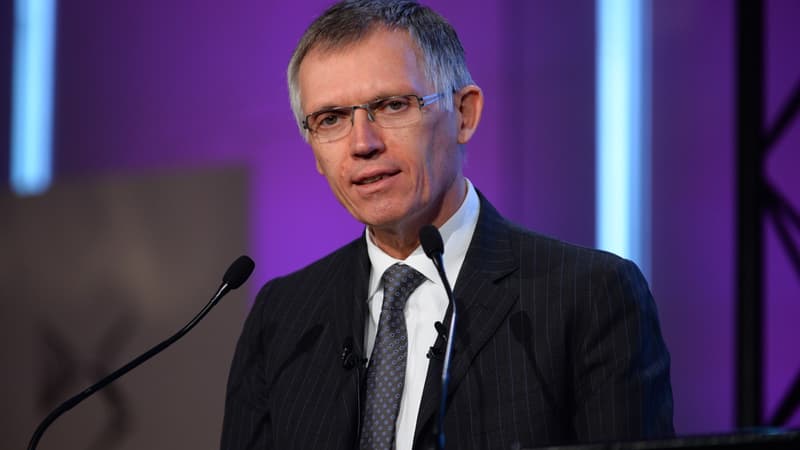How to produce small electric cars profitably in France? This is the background of the pass of arms that Bruno Le Maire and Carlos Tavares have been opposing since Wednesday.
The Stellantis boss explained yesterday that he would not produce the future electric Peugeot 208 in France because, according to him, it is too expensive. The Minister of Economy asked him to take up the challenge, highlighting in particular Renault’s strategy. The diamond brand will manufacture its electric R5 in Douai (North).
Renault, Stellantis, two strategies
Behind this verbal contest through the media, there are two different production models that are at the center of the debates. And therefore a different vision of profitability. For Renault, the transition to electric will be a transition made in France.
All the group’s electric cars – with the exception of the Dacia Spring, which is manufactured in China – will be produced in the north of France at the Electricity Pole, a pole that has three factories in Maubeuge, Ruizz and Douai. Precisely in this city the famous small electric R5 will be produced from next year. Its price is not yet official but it should be around 25,000 euros.
The Electricity division is the cornerstone of Ampere, the 100% electric subsidiary that Renault is in the process of setting up and which should go public next year.
At Stellantis, therefore, we did not make the same choice. The electric Peugeot 208 is manufactured in Spain, the electric Citroën C3 in Slovakia. “If we take the example of Citroën, we manufacture C5 Aircoss in Rennes, the replacement of this model that arrives within 2 years will have 100% electric versions, so we can manufacture cars with high added value, electric or not, in France, if He defends this Thursday at BFM Business from Thierry Koskas, the new CEO of Citroën, and he does it profitably. But the equation in small cars is quite different.
Why this choice?
For Carlos Tavares, the cost structure of the Western world is perfectly inadequate to compete with that of the Chinese manufacturers that arrive in Europe with costs between 20 and 25% lower. “The economic equation linked to the forced relocation of this project would not be in the interest of the company or the country,” he said in an interview with Le Figaro.
An impossible equation to solve according to him locating the production of the e-208 in France.
“For small cars, it is more of a challenge because the content of small cars is more limited, the margins are more limited and therefore the production costs are a very important element”, continues Thierry Koskas.
This question of production costs has as a direct consequence the sale price, according to the directors of Stellantis. However, the success of the energy transition depends on the price of the vehicles. It is therefore about taking advantage of low cost cost structures to offer models at attractive prices but that does not necessarily mean China, explains Carlos Tavares, it may be close to Europe or even in Europe. like Spain
It must also be remembered that Stellantis is a much more internationally focused group than Renault. Stellantis, as some in the auto industry say, “is the global company” with 14 brands. French brands of course (Peugeot, Citroën) but also Italian with Fiat and Alfa Romeo or even American with Dodge, Jeep and Chrysler.
However, Stellantis tempers the idea of a heartbreak between the group and France. We recall that the manufacturer has invested 2,000 million euros in France, has 12 factories in France and that it will produce 12 electric models in France by 2025, including the Peugeot e-308 and the Peugeot e-408. But no toy cars.
No disappointment between Stellantis and France
Furthermore, Renault, although it chose to produce its R5 in France, does not say otherwise. Yes, it costs more to produce a car in France than in Slovakia or China.
Obviously we can try to lower costs by manufacturing less complicated cars with fewer parts, fewer chips, but these are recipes that all manufacturers know, including Carlos Tavares.
In fact, Luca de Meo and the boss of Stellantis are on the same wavelength, they make the same observation: Europe and France, by opting for 100% electric, are in the process of rolling out a red carpet to Chinese manufacturers, to open wide the doors of the market to BYD, to MG, and this without protecting their manufacturers.
“I am also happy that we can say that the future electric C3, ‘well, it is not made in France but in Europe’. Let’s not forget that we are facing a great Chinese offensive magnitude”, summarizes Thierry Koskas. That’s what we have to deal with.”
The state must do its part
If they share the same observation, Renault and Stellantis do not draw the same conclusions. At Renault we explain that we are making a bet with the electric R5, we are playing made in France, but the State must also do its part of the work. Translation, give a boost to French manufacturers by ensuring, for example, that the green bonus cannot benefit Chinese cars.
Carlos Tavares’s message to the State is perhaps the same: ‘I am not going to transfer my production until it provides me with the means.’ Should we then bet on a change of course?
“A dialogue takes place, with great respect for both parties,” Carlos Tavares specifies, which is why he does not close the door completely. According to Les Echos, negotiations between the State and Stellantis on a possible relocation of the production of the electric 208 in France were still ongoing. “It is a fact that we are in continuous discussion with our main interest groups, including the governments of our countries of origin of France, Italy and the United States”, explains Carlos Tavares. Who wonders: “Are we asking Elon Musk or BYD to make B-segment cars in France when we are trying to lure them there?”
Source: BFM TV


